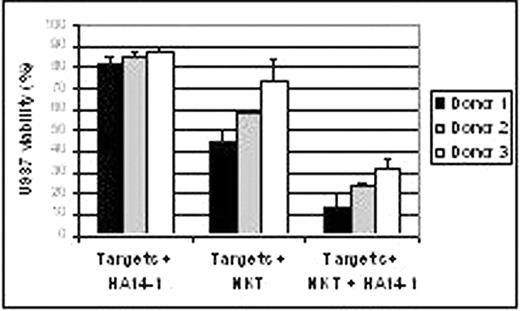Abstract
Invariant Vα24+ Vβ11+ NKT cells regulate immune responses and are capable of direct cytotoxic activity against tumour-cell targets mediated via the perforin/granzyme-B, Fas ligand and TRAIL pathways. A potential mechanism for tumours to escape immune killing is to block downstream apoptotic pathways by overexpression of the Bcl-2 oncoprotein. We therefore evaluated whether the Bcl-2-expressing U937 lymphoma line could be sensitized to NKT-cell cytotoxicity by coexposure to the HA14-1 small-molecule Bcl-2 inhibitor. Vα24+ NKT cells were purified from donor blood samples using magnetic beads and activated by exposure to KRN7000 and IL-2. U937 cells were labelled with the PKH26 membrane dye and then cocultured with activated NKT cells in a 10:1 or 20:1 effector: target ratio in U-bottomed 96-well plates. Cultures were performed in the presence or absence of HA14-1. After 4 hours, the cells were stained with annexin V-FITC and analysed by flow cytometry. Apoptotic and viable target cells were quantified as annexin-V positive and negative cells, respectively, in the PKH26-positive gate. Results of experiments on NKT cells derived from 3 donors are shown in the figure. Bars represent the mean percentage of viable U937 cells in triplicate assays and error bars indicate the SD. At the concentration of HA14-1 used, there was only minor single-agent cytotoxicity. However, a significant increase in U937 apoptosis was observed with the combination of HA14-1 and NKT cells compared to NKT cells alone. We conclude that the addition of the HA14-1 Bcl-2 inhibitor significantly increases the cytotoxicity of NKT cells against U937 lymphoma targets. This provides preliminary data supporting the possibility that the use of a combination of a small molecule inhibitor with immune therapy may increase the clinical efficacy of immune therapies that work via cytotoxic killing of malignant targets.
Author notes
Corresponding author


